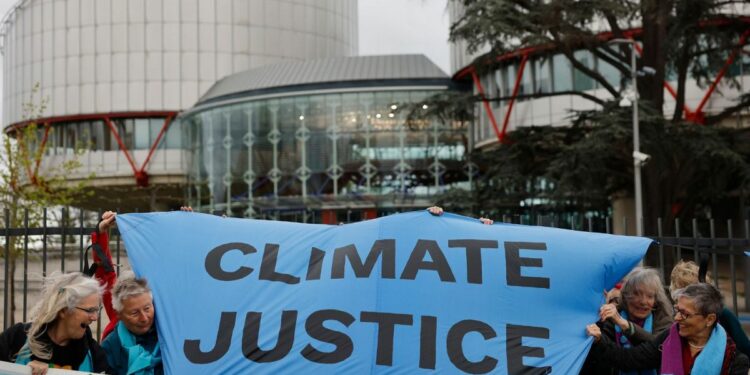The case was brought by an association of older Swiss women concerned about the impact of global warming on their health. They claimed that the Swiss government is not taking enough action.
The ECHR ruled by 16 judges to 1 that the KlimaSeniorinnen (Swiss Elders for Climate Protection) were subject to a violation of Article 8 as well as (unanimously) Article 6 – the right to a fair trial in their country.
“While we do not have all the details yet – this decision is historic!” writes Sébastien Duyck, senior attorney at the Center for International Environmmental Law (CIEL).
“The Court has found the petition admissible and finds a violation of the rights of the Klimaseniorinnen both on process and on the substance!”
Two other climate cases – brought by a former French mayor, and six Portuguese youth – were found to be inadmissible, however.
The Swiss case: Court rules human rights violated by climate inaction
The first of the cases was brought by KlimaSeniorinnen. This association of 2,500 Swiss women have an average age of 73.
The Swiss elders filed a complaint about various “failings” on climate change that “would seriously harm their state of health”. They argued that their government’s policies are “clearly inadequate” for keeping global warming below the Paris Agreement limit of 1.5C.
After battling in the Swiss courts for several years and finally being defeated in the Federal Court – the country’s highest – they escalated the case to the ECHR.
Today, the Strasbourg Court declared that Article 8 of the European Convention on Human Rights encompasses a right to effective protection by the state “from the serious adverse effects of climate change on lives, health, well-being and quality of life”.
It found that the Swiss Confederation had failed to comply with its duties under the Convention concerning climate change.
“There had been critical gaps in the process of putting in place the relevant domestic regulatory framework, including a failure by the Swiss authorities to quantify, through a carbon budget or otherwise, national greenhouse gas (GHG) emissions limitations,” according to the judgment.
Why was the Portuguese youth case thrown out by the court?
Perhaps the most wide-reaching case was brought by six Portuguese young people aged 12 to 24. Fires that spread across their country in 2017 spurred them to action.
Their case was not just against Portugal but every EU member state, Norway, Switzerland, Turkey, the UK and Russia.
ADVERTISEMENT
But it was partly this geographic stretch that made it inadmissible, the Court ruled today.
The ECHR found that there were no grounds in the Convention for the “extraterritorial jurisdiction” sought by the applicants.
Since the Portuguese nationals had not pursued any legal avenue in Portugal concerning their complaints, the complaint against their home country was also ruled inadmissible.
The Court adds that its decision in the case of ‘Duarte Agostinho and Others v. Portugal and 32 Others’ is final.
ADVERTISEMENT
It is a blow to many who saw this – in the words of Sébastien Duyck – as a “David v. Goliath case” commensurable with the stakes of climate inaction.
Why was the French mayor’s case thrown out by the ECHR?
A third case was brought by the former mayor of the French town of Grande-Synthe, Damien Careme. It complains about the “deficiencies” of the government putting his town at risk from rising sea levels.
Careme filed a case in France’s highest administrative court in 2019. France’s Council of State ruled in favour of the municipality but rejected Careme’s personal case which is how it ended up at the ECHR.
But the judges have rejected the ‘victim status’ of Careme, since he doesn’t currently live in France – having moved to Brussels to take a post as a member of the European Parliament.
ADVERTISEMENTWhat does today’s ruling mean for climate action?
These three cases raised several legal questions about a government’s obligations when it comes to climate change.
This includes their duty to prevent foreseeable human rights harms caused by climate change; who can seek protection and redress from climate harms from the ECHR; and the role of international law like the Paris Agreement in determining what is adequate climate action.
There is no specific mention of climate change in the European Convention of Human Rights. But the court has already ruled for industry and waste management that, based on Article 8 or the right to respect for private and family life, states have an obligation to maintain a “healthy environment”.
Today’s ruling in the KlimaSeniorinnen’s favour is “monumental”, says Corina Heri, a postdoc researcher in human rights law and climate change.
ADVERTISEMENT
“The Court seems to have spelled out a clear way forward for climate cases – and confirmed that climate change is very much an ECHR issue,” she writes from Strasbourg, while live-tweeting the hearing on X.
“This ruling in the Klimaseniorinnen case will have implications way behind Switzerland!” writes CIEL’s Duyck.
He points out that all European states have the same obligations as Switzerland under Article 8 regarding the need to protect the right to private and family life in the context of climate harms.
Six other climate cases adjourned by the ECHR will now be considered in light of today’s “groundbreaking decision,” he adds. These including cases where plaintiffs are opposed to Austria, Germany, Italy and Norway.
ADVERTISEMENT
Source link : https://www.euronews.com/green/2024/04/09/top-european-human-rights-court-could-rule-that-governments-have-to-protect-people-from-cl
Author :
Publish date : 2024-04-09 07:00:00
Copyright for syndicated content belongs to the linked Source.


